#homeschooling
Text
If you could answer this, put your country/state in the tags, and share this it would be appreciated! I'm an ex-homeschooler from Texas and I'm genuinely curious on what people from outside of America think about homeschooling or if it's even a thing elsewhere
#boost#b00st#share#poll#polls#i love polls#homeschool#homeschooling#school#public school#study#world#worldwide
11K notes
·
View notes
Text
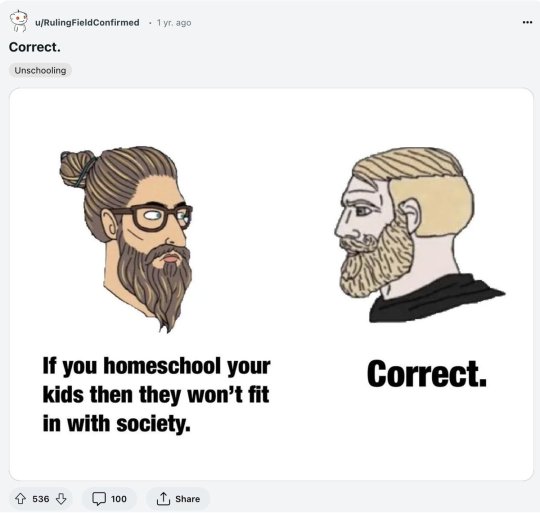
Reddit’s homeschooling page saying they don’t want their kids to fit in with and be able to adjust to society.
That’s, um, quite bad?
Tbh, I remember reading an article where they interviewed adults who’d been homeschooled and a few admitted that, while, they could never tell their parents, they felt it left them unprepared for the real world.
671 notes
·
View notes
Text
Look, as much as I have Complicated Feelings about both homeschooling and public school, it really is fucking damning to how badly run public schools are that I knew multiple families who were homeschooling their families not for any ideological reason like the standard "we want more Jesus in our schooling", but because their kid was Too Spicy for public school.
I knew a bunch of those kids. They were basically just kids with severe ADHD or some kind of emotional regulation issue.
There are ton of those kids. And apparently public school was failing them so badly that their parents decided just taking them out of school entirely and trying to teach them at home was easier and better.
And the ones I knew were families that had the money and/or time to homeschool! Imagine all the kids who had the exact same problems but their parents were too poor or they didn't have a family situation that'd make homeschooling possible.
So instead of a relatively functional but overly religious education, they were getting an education that was just completely failing them. They were learning barely anything and it was an open question if they'd be able to graduate high-school/get their GED. School was primarily acting as a babysitter for them, and not a very good one, given how many of these kids I knew were getting home schooled because they were (or were on the edge of) getting expelled because they fought other kids or vandalized something or whatever.
It's like, we built a system for "all kids" and then just are failing an entire group of kids so badly that many families decided that just doing it themselves would be better. Like, yikes, that is a massive failure on the part of the education system. Homeschooling is a very imperfect solution for that, and it's really sad how many families were having to use it.
Like I'd prefer a better world where public education can just handle that sometimes kids will have ADHD or autism and not fail those kids out so badly that some parents have to do their own school from scratch. Because that's a ridiculous state of things to be "normal".
382 notes
·
View notes
Text
Anyway, I've seen some rancid takes about this topic recently so here's a reminder that the homeschooler that's socially isolated and basically in a cult and was never taught science because Jesus said no is so rare that it's functionally a myth to make people against the idea of homeschooling in theory
#homeschooling#homeschool#not to say it doesn't exist but like#how many of those people have you actually met
1K notes
·
View notes
Text

Conservatives and homeschooling are textbook indoctrination. It's isolation from humanity. Kids belong with other kids. The mediocre parents avoid accountability, and we all pay the price.
359 notes
·
View notes
Text
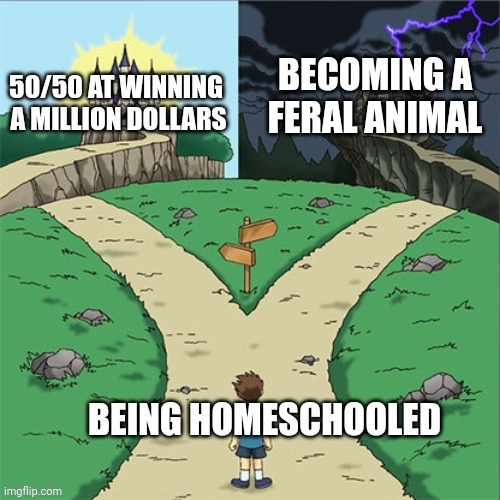
#total drama#total drama island#ezekiel#td ezekiel#ezekiel td#ezekiel total drama#total drama ezekiel#td cameron#cameron td#cameron total drama#total drama cameron#td shawn#shawn td#total drama shawn#shawn total drama#homeschooling#homeschooled#roti#revenge of the island#pahkitew island
217 notes
·
View notes
Text
In the homeschool co-ops I went to, class sizes were about half the size of what they are in public schools. We didn't meet every day, and the homework was mostly filling in the gaps for stuff we didn't have the time to schedule into the classes. We had a lot of science labs and a lot of discussion in English, which people actually participated in.
We also didn't strictly segregate by age. I was in class with people 3 or 4 years older or younger than me. I was friends with people 3 or 4 years older or younger than me. That was normal.
Most of the people there were Jews, Unitarians, Episcopal, or secular cultural Christians. We had one family who were devout Christians who didn't believe in evolution, and everyone thought they were weird as hell and didn't teach to their standards. Part of why my mom homeschooled was that when my older sister was in kindergarten she couldn't get it through the teacher's head that my sister would not be coming in on Rosh Hashannah.
I got extremely sick when I was 14, and it took me a year to recover. I did half as much work the next year, so I was able to physically recover. None of my teachers ever gave me shit about using the bathroom; I don't recall even ever asking permission to go.
It wasn't perfect; there were definitely times when my neurodivergence wasn't well accommodated, and I still got into trouble for talking back to the teachers. But if you'd put me into a public high school, I sincerely doubt I would have survived, and I 100% would not have graduated. And I was able to be reasonably well accommodated without getting a formal autism diagnosis that would hinder me as an adult.
the stereotype of the homeschooler who doesn't know social cues and has no friends is one I've been hearing since I could walk. I was homeschooled because I was AutHD, not the other way around. Correlation is not causation.
And I firmly believe that right now, banning homeschooling is just going to end up failing millions of disabled, neurodivergent, and minority kids. We need to massively overhaul the public school system instead of taking away the best outlet kids like me have.
154 notes
·
View notes
Text

𝐝𝐞𝐬𝐢𝐠𝐧𝐞𝐝 𝐟𝐨𝐫 [𝐡𝐨𝐦𝐞 𝐬𝐜𝐡𝐨𝐨𝐥𝐢𝐧𝐠]
https://www.pinterest.com
63 notes
·
View notes
Text
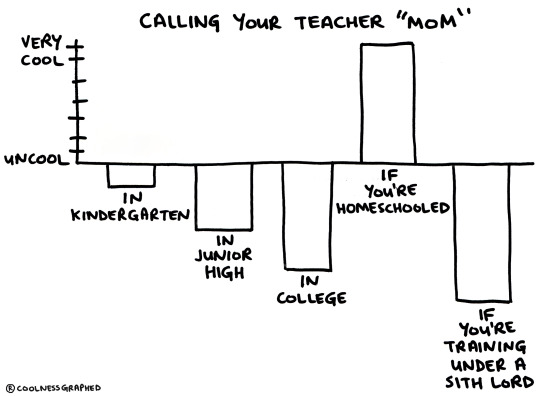
#school#mom#star wars#bar charts#cool#calling your teacher mom#Sith lord#Darth vader#emperor palpatine#kindergarten#junior high#homeschooled#homeschooling#mr feeny#middle school#coolness graphed#bar graphs#lol#webcomics
216 notes
·
View notes
Note
I don’t know if I agree with homeschooling. I always found it doesn’t really expose kids to the real world and kind of teaches them to bubble wrap themselves from the rest of the world. Did you have a good experience being homeschooled and feel differently? (PS. This isn’t supposed to be an argument or a jab, just thinking about stuff!)
Well, in one sense, you are correct.
Homeschooling does not expose children to the evils of the real world before they are ready to comprehend them.
As a child, I was not exposed to porn, sex, drugs, bullying, verbal abuse from my peers, physical or sexual abuse from others, or authoritative abuse from adults.
Now, I'm not saying these things cannot/don't happen within the home. They do, and it's evil. However, there is a far lesser chance of them happening when you, the parent, are actively engaged in your child's life and education.
Instead, my childhood was one of love and support and growth. My interests were fed and developed, and my needs met both emotionally and intellectually by my parents who were both fully invested in my education and development.
My experience with homeschooling (as well as the majority of my friends') is that we were educated at a pace that was our own, many times a faster rate and higher level than our peers within public school. I normally finished all my "in the books" schooling for the day from 10am-1pm. Even so, when compared to my peers, I tested one to two "grades" higher than my age range.
My exposure to "real world" issues was monitored by my parents. I had discussions about what sex, marriage, racism, politics, government, abuse, and various other "real world" topics were at an age appropriate level that gradually advanced until I was about 17 yeas old.
As far as "real world" experiences go:
I volunteered at a hospital during my teenage years.
I knew how to work and how to manage my money from the time I was fifteen. (First babysitting, then eventually retail.)
I was in soccer as a kid and later did martial arts for ten years.
I learned and talked politics with my family and other home schooled kids from the time I was fifteen.
I had a class specifically titled "worldviews" in which I learned not only my Christian worldview, but about other religions and politics and current cultural events happening around us.
I learned about puberty in a safe environment with all my questions answered and the comfort of understanding what was happening.
I never had to deal with crude comments or abuse as a young girl.
I consumed media that was age appropriate and anything I encountered that I questioned or was unfamiliar with, I brought to my parents whom I trusted and would always discuss things with me in a mature manner.
I grew up with a consistent friend group that I trusted and still have to this day, though time has changed our dynamics and relationships. Currently, I'm quite content with my ability to make friends, socialize, and the number of friends I have.
My relationship with my parents was strong and held mutual trust. I was monitored as a small child, but gradually gained more independence as I got older and understood more about the world. If I had questions, I would bring them to my parents with no hesitation, embarrassment, nor fear. That relationship still remains, though now I'm a good number of years into adulthood.
Every challenge I faced growing up, I felt prepared for-- because my parents had taken the time to prepare me for it. In my education, work life, social life. If it was unfamiliar, I would bring it to them, but I rarely had to. I knew how to problem solve and think critically. I knew how to think things through and address adults and those in authority even if I was in an unfamiliar place. I could find my way around situations with little anxiety.
When it came time for college, I tested higher than average and was asked if I'd graduated in the top 5% of my class. I am now in an honors program and recently accepted into the highest ranked honors society across all majors in the country.
What real world experience does a child need that their parents cannot provide them when they actually invest in their children?
Society trains us into believing that a parent cannot provide their child with the education, development, and "experiences" they need. But what are these "experiences"?
Our media is flooded with horror stories and abuse victims of the public school system-- from burnt out teens, to abuse, to drugs and pregnancy, to anxiety attacks, to bullying, to pornography exposure.
What benefit does it give you as a parent or your child to hand them over into the hands of strangers (whom you're told to trust) for 8+ hours a day to sit in a chair and be lectured to with little to no expression or socialization with anyone outside of the classroom environment? They may sit in the same room as other peers (not allowed to move or talk), walk the same halls, eat in the same places, but they are not learning to properly engage with the world around them.
Children primarily interact with others their age during the day, and in what way is their conversations developing life skills that they need? Yes, they have friends and that is good. People need healthy friends. But a majority of the people they engage with are not their friends and they are not learning how to handle tough situations with individuals.
They are learning to judge one another, to morph and fit in, to avoid being bullied, to become the cutout that the government appointed educator approves of.
I always remind parents, schools don't just teach "abcs" and "123s". Schools form your children's entire foundation and worldview. The internet indoctrinates kids more than anything else once you let them have access to it.
Do you trust over 100 other children to have your child's well being and best interests at heart? Do you trust the government appointed official? Do you trust the internet?
Either you raise your kids; or someone else will.
You teach your child; or someone else will.
#homeschool your kids#homeschooling#homeschooled#homeschool#home school#anon#on homeschooling#hall of fame
519 notes
·
View notes
Text
How to HELP Children learn?
Tips for Successfully Teaching Children
Be gentle and respectful at all times. Equality is important even if there is an age and intelligence gap.
Create the right environment which is free from stress, pressure and fosters creativity, trust, curiosity and fun vibes. Keep the pace of learning comfortable for the child.
Cater to the specific learning style of the child and learn to observe their areas of interests and listen to what motivates them. Participating and self-expression is essential to keep the child engaged.
Try out a combination of learning methods to help the child understand, such as tactile, movement-based, visual and auditory. Always provide context for what is being taught and why we need to learn it from a larger perspective.
Stick to the basics but also be spontaneous with the curriculum. The right mood for the right subject is important. Take time to present information in an appealing manner that excites the child.
Be in the right mind space attitude and energy when you are going to teach the child. If you lack enthusiasm, learning will suffer.
Teach as per the individual’s grasping power and introduce new concepts only when the foundation is ready for them.
Keep it light and don’t overload or confuse children with unnecessary information. Make sure they have understood before moving forward.
Each individual has subjects that they are more drawn to versus others. Choice is a gift, hence we need to honor the choices of children and understand that each one is born with a unique purpose.
#parenting#teaching#teachers#homeschool#homeschooling#home school#children#child development#child psychology#rainbow children#new earth#starseed
74 notes
·
View notes
Text
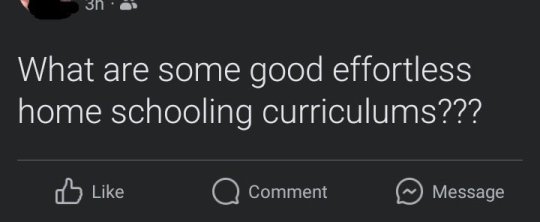
This is why homeschooling needs to be regulated way more. A lot of parents might like the idea of homeschooling, but then, realise: “Oh, right. Stuff like Algebra and physics can be hard.” And usually they can’t afford maths/science tutors, so they end up trying to pick “easier” subjects and the child suffers because their education isn’t at all well rounded.
Don’t get me wrong, I love arts and crafts as much as the next person, but it can’t be your entire education, either.
396 notes
·
View notes
Photo
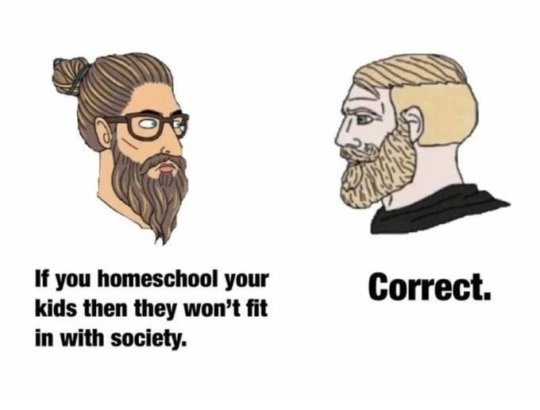
I see absolutely no downside.
338 notes
·
View notes
Text
Had dinner with some public school teachers last night and let me confirm for you it doesn't matter if they are a math or science teacher or its Wyoming, Kentucky, or Idaho they are progressive agitators there to indoctrinate your children. They only live in your state because its cheap, they like the bike paths, or something like that. They are nothing but sycophants for the imperial power of D.C. and can't even conceive of a world where the state isn't god.
Take your kids out of public schools.
192 notes
·
View notes
Text
69 notes
·
View notes
Quote
I will speak to you today about homeschooling, specifically evangelical homeschooling. I will speak about homeschooling because homeschooled children and alumni are intimately familiar with religious trauma. This is because the vast majority of homeschoolers are evangelical Christians. Consequently, many homeschooled children have experienced corporal punishment, threats of eternal hellfire, educational neglect, molestation and rape, and other human rights abuses—all in the name of glorifying the evangelical god. In fact, due to the intentionally deregulated state of homeschool laws in the United States, homeschool parents have nearly absolute power over what they can do to and teach their children. Homeschooling has thus become a tool for what psychiatrist Robert Jay Lifton has called “totalism.” Totalism is the end goal of authoritarian and totalitarian movements and organizations: it is the total control of human action and belief. By enabling homeschoolers to use homeschooling totalistically, deregulated homeschooling has created the perfect storm for abuse and neglect to thrive in homeschooling communities.
Traumatic Homeschooling: How Evangelicals Use Education to Totalize
53 notes
·
View notes